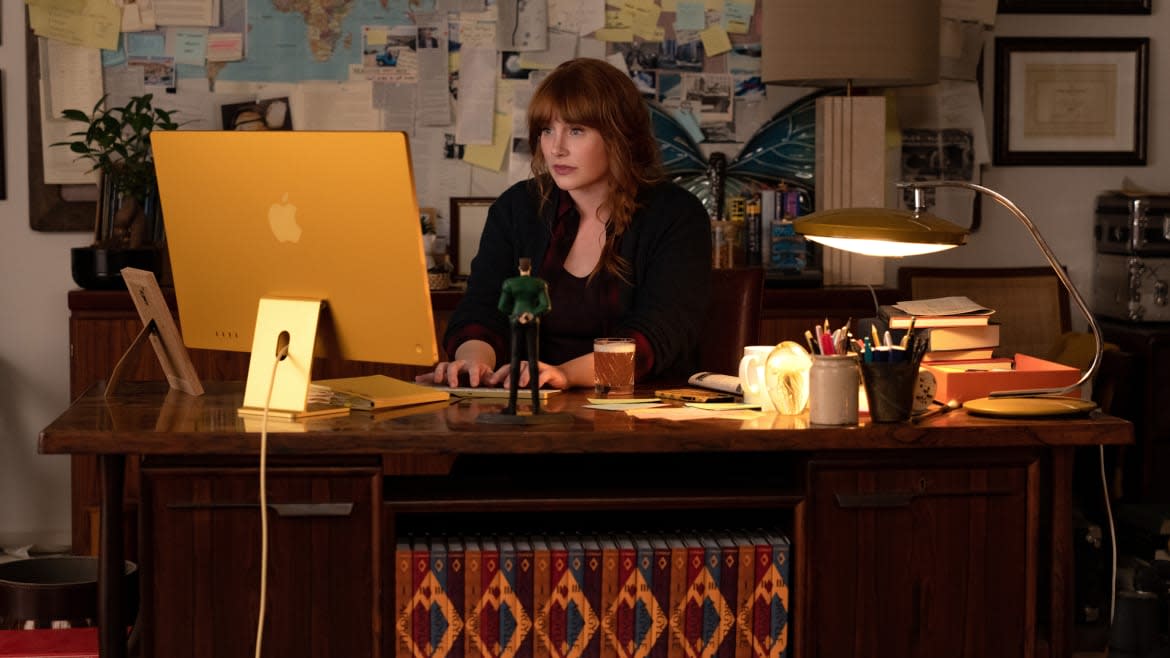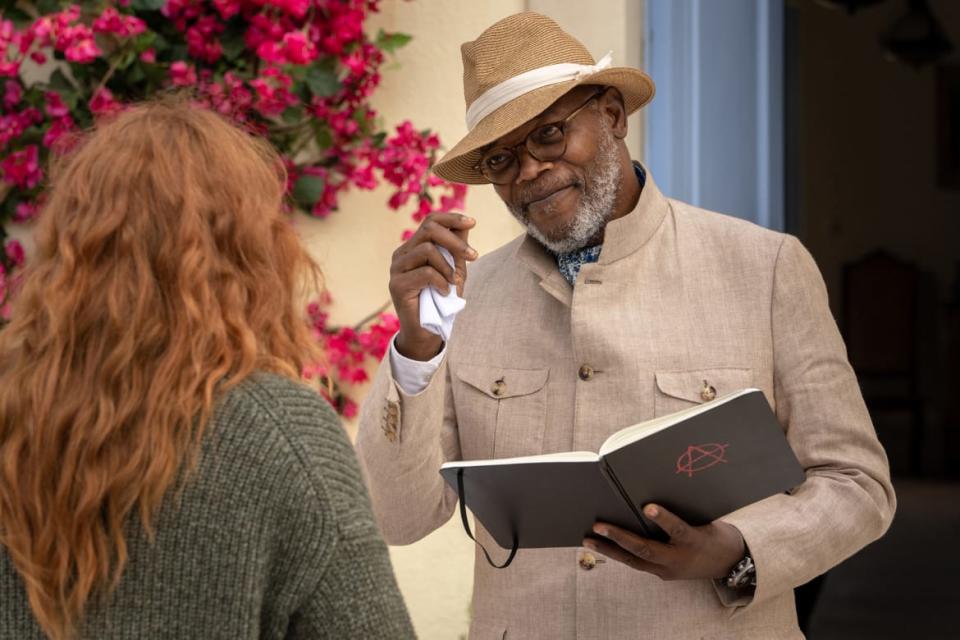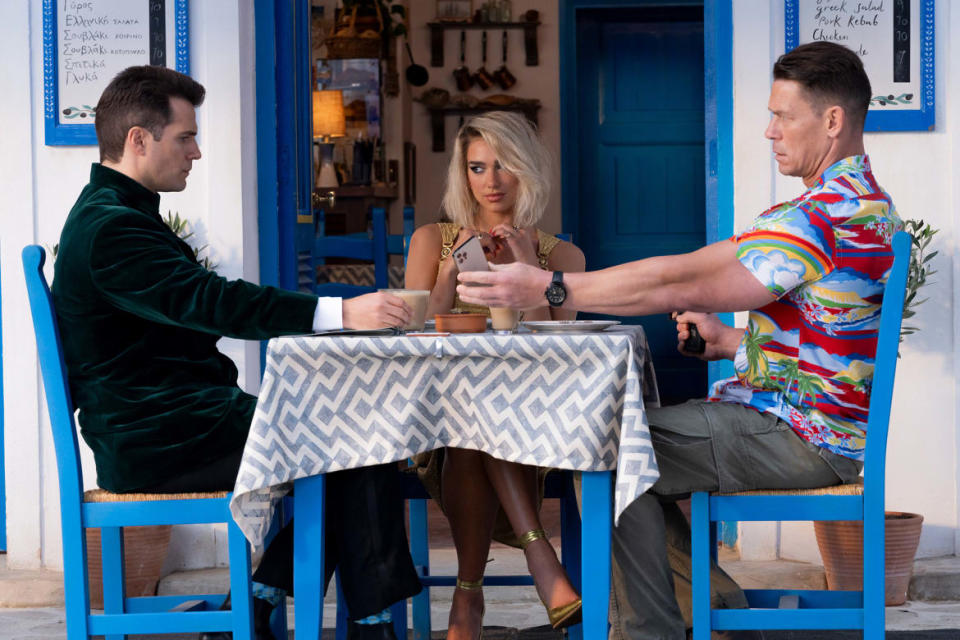‘Argylle’ Has So Many Stars, Yet So Little Fun

As a director, Matthew Vaughn (Kick-Ass, X-Men: First Class, the Kingsman series) is like a brasher, more cartoony version of Guy Ritchie, all “crazy” badass bluster and pop genre posturing, and he doesn’t alter his over-the-top ways with Argylle, a scattershot and empty-headed spy story that futilely tries to tap a Romancing the Stone (or even The Lost City) vein. Its comic touch almost as heavy-handed as its slow-motion-drenched action is dull, it seems primarily designed to answer the question, “How many movie stars can one fiasco squander?”
Argylle (in theaters Feb. 2) is brimming with marquee names but at the center of its nonsense is Elly Conway (Bryce Dallas Howard), the author of a popular spy series concerning Argylle (Henry Cavill), whose heroic exploits play out on screen in goofily extravagant sequences that don’t resemble 007 so much as Austin Powers, replete with bright primary colors, fanciful settings, and absurd outfits.
Argylle wears a wide-shouldered black suit and sports an idiotic-looking flat-top, although neither gets in the way of him showing off his dance floor moves during an opening face-off against LaGrange (Dua Lipa), a golden-dressed sexpot he’s been tasked with apprehending. Argylle is soon chasing LaGrange through Greece in a vehicular pursuit that rivals Bad Boys 2 for metropolitan destruction, with Vaughn employing the chintzy CGI that will dominate the remainder of the proceedings.
Such outlandish mayhem is taken from Elly’s best-selling fourth book, and at a public reading, she shrugs off a fan’s comment that her made-up stories have prophetically predicted real-world events. At home with her beloved cat Alfie, she finishes her latest tome, only to hear from her mom Ruth (Catherine O’Hara) that she can’t conclude this sequel with a cliffhanger. Elly agrees and decides to visit her mother to work out a final chapter.
Yet while on the train (with Alfie stuffed in a backpack, his face visible through its window), the boundary between fiction and reality evaporates as she’s joined by Aidan (Sam Rockwell), a scruffy stranger who, following some initial banter, reveals himself to be a genuine spy. Worse, he informs Elly that the rogue espionage agency from her novels actually exists (it’s known as the Division), and it’s sent henchmen to kidnap her—resulting in a helter-skelter skirmish between scores of anonymous adversaries and Aidan, whom Elly keeps envisioning (at least in her head) as Cavill’s Argylle.
This is the beginning of a long-form game of pulling the rug out from under Elly and, by extension, the audience. Alas, whereas its protagonist is clueless about the nature of this madness—and, just as importantly, Argylle’s identity—until a midway-point revelation, the film tips its hand early and then lobs so many unconvincing misdirections that it’s easy to guess where things are heading. Argylle’s lack of surprise is enervating. Still, it’s not as crushing as the lameness of its predictable twist. Discussing the plot’s second half is borderline impossible without giving away its chief bombshell, yet it’s safe to say that anyone paying attention to Elly’s first scene, or willing to do some basic process-of-elimination analysis of the scenario at hand, will find this eye-opener more deflating than shocking.
Even setting aside that disappointment, however, Argylle is a waste of many gifted people’s talents. Faced with certain death, Elly is forced to go along with Aidan, who may or may not be crazy (or a villain), thereby creating a dynamic that’s faintly reminiscent of Tom Cruise and Cameron Diaz in Knight and Day.

Samuel L. Jackson
Unfortunately, Howard and Rockwell share zero humorous or romantic chemistry, and their characters’ breakneck situations are of a pedestrian sort. Not helping matters, almost every one of the film’s exterior locations appears to have been created with a green screen, lending the material a phoniness that extends to the saga’s nominal bad guy, Ritter (Bryan Cranston), who runs the Division from a control room that’s divided between an all-chrome work area and a cozy, mahogany, fireplace-warmed den. Barking orders at his minions and waxing poetic about his grandfather’s shotgun Clementine, he’s the definition of a generic Big Bad, including with regards to his ho-hum motivation for going after Elly and Aidan.
Ritter wants to reclaim a damning master file that catalogs his organization’s dirty deeds, and Aidan wants it as well—and believes that Elly can deduce its location by simply coming up with the conclusion to her new book, since she’s a veritable “fortune teller.” This is daft, albeit in keeping with the film’s decision to have said file stored on a USB drive that’s hidden inside a silver bullet that’s currently in the possession of the “Keeper of Secrets” (Sofia Boutella), who handily explains that “There’s a reason I’m the Keeper of Secrets. It’s because I keep them.”
It’s not just that Argylle is unnecessarily convoluted; it’s that it’s extravagantly insipid, highlighted by a late shot-through-the-heart bit that Aidan accurately describes as “the dumbest thing I’ve ever heard in my life.” Elly routinely talks to Argylle in the mirror (he coaches her to be brave), and she eventually has a run-in with Alfred Solomon (Samuel L. Jackson), who runs a vineyard in the French countryside and spends the latter portions of these escapades sitting in a giant control room watching a Lakers game while waiting for someone to send him a de facto email.

Henry Cavill, Dua Lipa, and John Cena
There’s plenty of additional snooze-worthy stuff wedged into Argylle, the dreariest being a balletic shootout in which heart-shaped plumes of smoke swirl around two amorous gunfighters. Rockwell hams it up, Howard affects varying degrees of bug-eyed expressions (until she doesn’t), Cranston bellows and seethes, and the rest merely sleepwalk on the way to a conclusion that sprinkles some The Manchurian Candidate-style brainwashing into the messy mix.
Despite his every move proving clunkier than the last, Vaughn triples down on his missteps, resulting in three separate uses of The Beatles’ “new” track “Now and Then” and repeated wannabe-zany close-ups of Elly’s CGI cat—not to mention multiple showdowns that would have served as perfectly fine (and merciful) conclusions if not for the director’s indulgent desire to distend this tale into a 139-minute debacle.
Get the Daily Beast's biggest scoops and scandals delivered right to your inbox. Sign up now.
Stay informed and gain unlimited access to the Daily Beast's unmatched reporting. Subscribe now.


